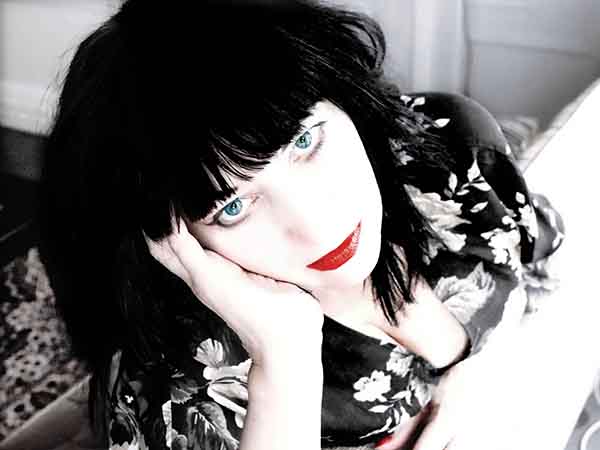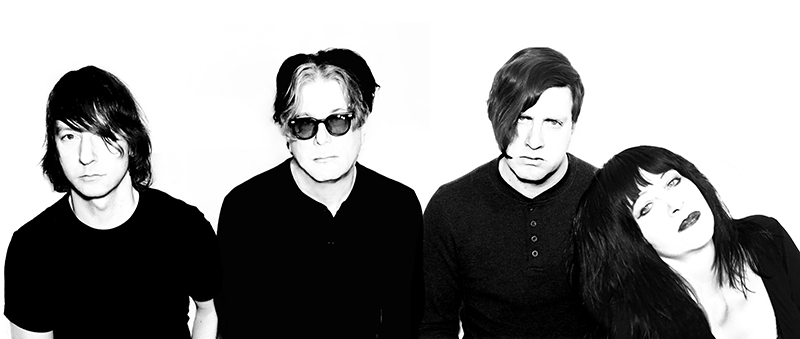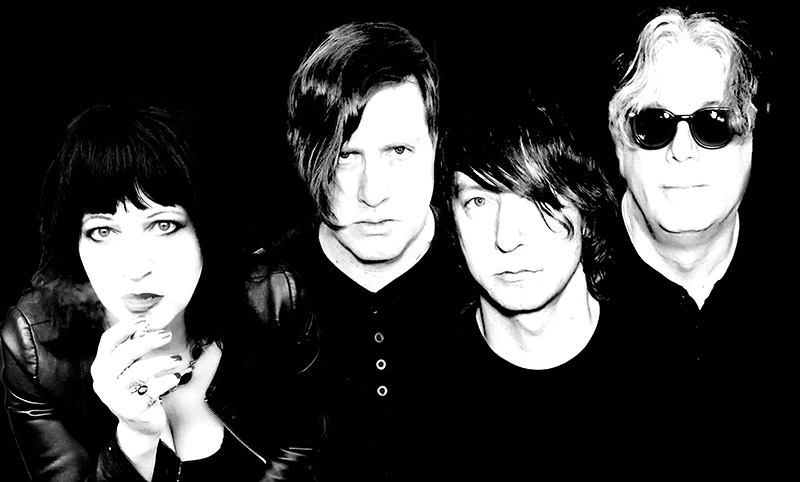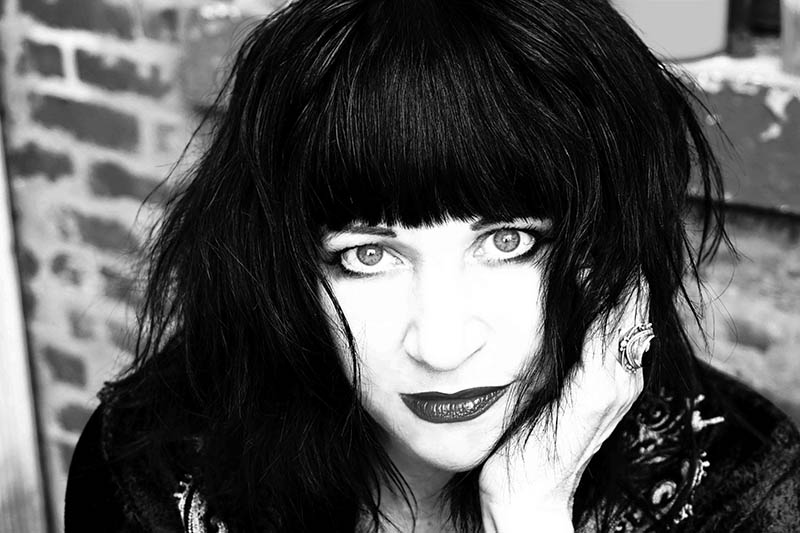You moved to New York in the mid 1970s. What was New York like - culturally, economically, socially - when you moved there in the 1970s?
It was devastated, it was burnt out, it was bankrupt, it was criminal, I guess it was dangerous to some. Culturally it was starting to go into overdrive. I got there in 1976, and by 1977, many people had come from different areas. I don’t know why - this was pre-technology - but any geographical location can act as a magnet.
You can go back to Paris in 1920’s, Berlin in the 1930’s, Chicago in the 1940’s, Memphis in the 1950’s, Haight-Ashbury in the 1960’s, LA, London, LA, New York and Australia in the 1970’s.
Once technology hit, I don’t think a centre of gravitational force became so predominant. I left New York in 1980 for a few years, came back in 1984, and then left in 1990 for good. Now I’m back here briefly just to work with people I work with.
I left because I knew by 1980 that it was going into Disneyland, and by 1990 it was certainly over. Now it’s just a bunch of rich kids living on daddy’s money. It’s nearly impossible for any artist to live here, and I’m just scraping by to do it to work with people I like, and I don’t think I’ll be here much longer because I’m quite nomadic. I’ve lived in quite a lot of places.
 Jasmine Hirst photo
Jasmine Hirst photo
You’ve been very open about the abuse you suffered as a child, and how it underpinned your art. At what point in your life did you see performance art as an outlet for how you were feeling?
I thought spoken word was the outlet. I didn’t consider myself a performance artist. I still consider myself basically a confrontational artist, based on spoken work and a conceptualist. I guess from the age of about nine, when I started writing, and 12 when I started reading, my literary heroes were Miller, Selby, de Sade, Genet, Foucault, I realised the path I had to take was to invent a female version of the same perversion they were talking about, and I thought that would be spoken word.
When I came to New York in 1976, it was post-beat, post-Patti Smith and pre-slam poetry, so I had to start with music. It wasn’t until later, in 1982, that I began curating shows of spoken word. Other American artists and musicians, like Henry Rollins, Jello Biafra, also began doing spoken word. The Reagan era forced us all, and allowed me to start doing what I came here to do, which is spoken word.
I’ve read you say that you never considered yourself “punk rock”. Was there any relationship between punk rock and no wave?
No, they were the antithesis of each other. It’s easy, to me, to sum up what no wave was. Punk rock, even though you hear the term, it’s a broad stroke. Groups like Magazine are referred to as punk rock, which I don’t think they are. To me punk rock is traditional rock’n’roll, sped up, with a social conscious and a fashion aesthetic.
No wave, other than myself and James Chance, had no fashion aesthetic, it was about personal insanity. And none of it sounded the same, whereas punk rock pretty much has a sonic parameter, in the same way that country or opera does. No wave, in my view, was harking back to Dada-ists and the surrealists because it was so absurdist, and was only a movement outside of everything else.
How much contact did you have with the protagonists in the punk rock scene? They would still have been around at that time.
Which punk rock scene are you talking about?
The New York punk rock scene that was associated with CBGB, people like Richard Hell, The Ramones.
To me Richard Hell wasn’t really punk rock. He was rock’n’roll, with an amazing guitar player, Robert Quine. I don’t think his music is truly punk rock, it’s traditional rock with a weird guitar player, whose [Hell’s] look was co-opted by punk rock.
Robert Quine, I went up to him after the first Voidoids show and just pledged my allegiance to him as guitar god! Hence, he had empathy for me, and even produced some of my records and played on some of them. There were so many different kinds of music going on in New York. A lot of those people ran away from me because I was younger and cuter than them! The music of Richard Hell may have inspired me, but I rebelled against by doing something like Teenage Jesus, because it wasn’t radical enough for me.
 The Retrovirus Glee Club.
The Retrovirus Glee Club.
After you left New York, you moved to New Orleans, which is like nowhere else in the United States. Is that part of the reason you decided to move there?
I’ve lived in many cities. I first left New York, and went to LA in the early 1980s, then I went to London and worked with Rowland Howard from the Birthday Party for a while, then I came back to New York for a few years, then I moved to New Orleans, mainly because of the economy. It was really depressed and cheap [in New Orleans], I didn’t know anyone there, so that was a good reason. I was just called to the South, and then when I got there I thought it was a good place to invite Rowland to come down to do our project Shotgun Wedding. After then I moved to San Francisco, then Pittsburgh, I’ve lived in many places.
But New Orleans, at the time, pre-Katrina, the hurricane but a man-made disaster, had a unique soul outside of mainstream America, which was mainly because of the voodoo, the black music, the geography of the place, which is a few metres under sea level, which traps in a lot of energy, which makes something like voodoo an obvious thing. Because when energy is trapped, it’s gotta go somewhere, and it’s going to squirrel around your house and cause shadows to form et cetera et cetera.
Whenever I’ve moved, it’s always been quite reasoned, whether it’s economy, architecture, for collaborators, often because I didn’t know anyone there, or just whatever I could afford at the time. I left America to live in Barcelona for a few years, mainly because I perform in Europe a lot, and America was going into the Fascism that it’s now fully embraced.
You’ve worked with a wide range of musicians and artists. What do you look for you in your collaborators?
First of all, I’m a conceptualist, so I design the concept first, then work out who can most take it to the furthest of its design. I’ve never chosen anyone to work with because of who they are, but I chose them because they could help the concept. It’s the concept first, then who’s appropriate for the concept. If I can get them into the fold, then we document the concept to the fullest of our ability, then maybe take it on tour.
I don’t tend think about who I want to work with next, though I have approached most of the people I’ve worked with. But with Weasel Walter, he approached me to do guitar. I knew he’d be appropriate for retrovirus because he was very familiar with my music. Rowland approached me to do “Some Velvet Morning”. But it’s always about who is appropriate for the concept.
You had a long friendship and artistic association with Rowland Howard. What was it about Rowland Howard that made him appropriate for the Shotgun Wedding concept?
Rowland first approached me to do “Some Velvet Morning” [in 1982]. I’d already covered Lee Hazlewood, and I was amazed that anyone else knew who Lee Hazlewood was. So we did that EP. We did another record, "Honeymoon in Red", which was lost for eight years until I got that back. That wasn’t really a concept, that was going into the studio with a random handful of songs. It was lost, and I finally got it back, and reconfigured it a bit.
New Orleans was perfect for Rowland. I wanted to do something that was swamp-rock, very ethereal, I don’t want to say voodoo, but he was magical, so I just thought it was the perfect place for him to come down and make some songs with me. Hence, we did the beautiful record which was “Shotgun Wedding”, then went on tour a few times to Europe. Every note he played with just magical and special. He was very romantic and also very funny. He had me laughing all the time.
You toured Australia with the Shotgun Wedding project in 1995, with a band that included Rowland, Spencer Jones, Harry Howard and Craig Williamson. What are your memories of that tour?
You want me to dredge my memories, the slippery slopes of my memory bank [laughs]? I love coming to Australia, I loved playing with Rowland, I loved Shotgun Wedding. Other than that I can’t really find anything specific, it was an outstanding experience. It’s more the sum of its parts, more than a specific dimension.
You incorporated the Beasts of Bourbon’s “Hard for You” into your set. Why did you choose that song?
I love the Beasts of Bourbon! I love Tex Perkins, I love a lot of what they did. "Hard for You" is a nice and raunchy song, baby! What more can I say, it was a raunchy great tune.
You’ve lived in Barcelona for some years. The Australian art critic Robert Hughes started writing a history of Barcelona art, and found himself drawn to writing a history of Barcelona itself. What has living in Barcelona done for your own art?
What’s amazing to me is that I first went to Barcelona in 1984, and the moment I got there, I knew I would live there eventually. I don’t know what drew me there. Part of it was the juxtaposition between the brutal history of Spain, The Conquest, The inquisition, and then its incredible architecture, its respect for art and artists.
Because of the religious persecution that Spain had imposed on other people, people were actually protesting the Pope coming there. I loved the pageantry, I loved the rituals. It was just a very duplicitous environment.
At the time I went there, it was 30 years out of Fascism. I became very obsessed with Belchite, which is a small town between Barcelona and Madrid, which Franco had bombed to smithereens in 1936, killing all 6000 people. I would go there, it was still one of the largest ruined battle zones, and I would go there to do to photographs and videos to use as backdrops to my speeches about war. I did a whole live performance called “The Real Pornography”, which was about war.
One of the things that kept me in Spain was Belchite, and also that Spain has this constitution that’s written that says you can’t speak about the civil war. 100,000 people are still not accounted for, [poet] Federico Garcia Lorca was killed, they don’t know where his body is.
I did a performance there called “The Ghost of Spain”, as if I had to speak for Spain, I don’t know why, for those who were unheard. I also loved that I felt like an endless outsider there. Catalan is a bit like Russian, it’s almost impossible to speak. I did a lot of shows there, but I could just sit outside and still obsess about the horror that is American, but in a location that, for those years at least, soothed and salved my soul, which was important before I did something deadly to a mass population or myself!
The Anarchist Movement basically started in Spain. Political protests in the 1920s and the 1930s were incredible. The anarchists won for a while, then they fell, then the fascists took over, then I moved there.
Spain has a wonderful relationship with food, and then you went off and did a cookbook. Was that in any way influenced by your time in Spain?
Spain has a very different relationship with food from other places with a café society. For somewhere that has a three-hour lunch. No-one sleeps during siesta, what they do is to go off and have lunch, drink and talk for three hours, then they go back to work. It first it’s very alarming, until you realise so many places are mum and pop, and why shouldn’t granny who’s at the same store for 40 years, go and have a three-hour lunch break? It’s actually very civilised.
I didn’t write a cookbook because I was living in Spain, I wrote a cookbook because there is the show, “True Blood”, one of the characters on it said she’d based her character on me. Her character would do these food-drug-laced orgies, calling up Dionysian visions, so I thought that was a good reason to write a book called The Need to Feed. Also, when you’re on tour a lot, you have to take care of yourself. When you’re poor, you have to cook! That’s it. Also, I love knowing that people are eating little bits of my DNA when I feed them. It’s very witchy!
You’re very caustic in your assessment of the United States. Where else can the country go, now that Trump is in power?
That’s why I’m back, because it’s so fucking outrageous! I feel as if all my predictions have come true, and that nobody can deny what I’ve been saying. It’s a conspiracy of idiots, it’s a kleptocracy, it’s a cockocracy, it’s the murderous nation on earth, we’ve been in war for every year except 20 of our 240-something-year history. It’s just unavoidable that I should be here now, it’s an atrocity of ass-clownery. It’s endlessly fascinating to me, the arrogance and the hypocrisy and the lies that are going down, so it makes sense that I’m here now.
A sizeable chunk of your work takes aim at patriarchal oppression. What’s your assessment of the so-called #metoo movement?
We don’t even have time to go into that at the moment! My first spoken word piece was called “Daddy Dearest”. I’ve been dealing with this issue for decades. What I don’t get is why it took high-paid, high-class call girls 20 years to cunt-front the issue that we all know is global, and that’s specific to one particular area. I’ve been taking on the father-god, the father of our countries for decades. This issue has to be talked about, and I’m glad it’s out there.
The wearing of black as protest, I’ve wearing black for 40 years as protest against the death of intelligence, give me a fucking break! It’s been co-opted from what it started out, but the movement that’s grown is very important. Victims have to be heard. I just don’t understand why it took so long to get the point across.
If I see a huge naked man in a room, I don’t go inside it without some kind of weaponry to crack a dick or castrate it, but that’s just me. And I have to blame mothers for not training their daughters in self-defence, verbal self-defence. And that’s just someone that’s survived. I had a horrible childhood, and I learnt very quickly that I was not going to be a victim any longer of that kind of nonsense.
It’s a very tricky subject, it has to be talked about, it has to be called up. It’s such a broad stroke that people are painted with, and I’m afraid that real trauma, real rape, real victimisation gets mingled in with “Oh, he touched my tit”. How do you define men being flirtatious or of a certain generation, which means they didn’t really know any better because the 1970s were outlandish, or constant harassment and then rape.
It’s such a broad subject. I just refer to Camille Paglia, and say “Get a grip, people”, and we have to discuss this. When the President of your country is a serial abuser, it’s just too cunt-founding to me to begin to even take it on.
You’re a self-described confrontationalist. Do you have any self-imposed limitations on your art, or topics you don’t want to go near?
Oh please! There’s no tempering of my mood, hence why a lot of my early work, like “Daddy Dearest”, the films I did with Richard Curren, which were trying to post-Polanski describe a female sexuality which existed but hadn’t been talked about. My book “Paradoxia”, I’m laying a certain type of personality there, with a psycho-sexual disorder in a public therapy session, to speak for other people that have suffered from the same kind of obsessions, trying to not exactly find if there is a cure or an answer, but a description that makes people realise they’re not so alone in their reactions, which are all so fucking human!

You mentioned Foucault earlier. One of the things that’s always struck me about Foucault is that he not only deconstructed the institutionalised discourse of discourse and its attendant power relations, but he also practised what might have been described as “deviant” behaviour, most notably sado-masochistic practices while high on acid when he was in the United States in the 1970s.
That’s what everyone should do for a short period in their lives, but of course there’s no acid left! So just rule that out! Anything that expands the mind is good. Foucault wrote so many great books that really informed how the real situation inside culture and society is against the individual.
And as well as Foucault, there’s Artaud and Mike Davis, an American writer. Mike Davis is a sociologist writes books about dead cities, which are cities that have crumbled into slums and everything in between. He also writes about the human condition on a grander scale.
I focus on two things: the individual, whether through music or the spoken word, our romantic obsessions, our sexual dilemmas, utopias or dystopias, and on the political confrontation against the individual. They are basically my themes.
Like most writers, we have one obsession and we re-write it in different forms, which is why I had to develop a musical schizophrenia to be able to house basically what are our similar obsessions, and find a different way to express them. As Foucault wrote constantly about, the oppression of the individual by societies’ unnatural norms at the time.
Finally, your Retrovirus show traverses your career over the last 40 years. Is there any part of your back catalogue that you avoid re-visiting?
Hell no! It all had to be done at the time. Basically, as a historian, or a hysterian, all that I’ve done is try to find a way, at the time, to manifest out of my personal or political predicament. So it’s timely to what it was. It’s always a next step, leading to the next step. I don’t think you can really isolate one thing from another, you have to view the whole body of work, and see it as one small part of a whole, which is one woman with a big mouth, trying to thrive rather than merely survive under the oppression of a patriarchal, which is genocidal, homicidal, raping, plague upon the planet.
That hasn’t changed. It’s as now as it’s ever been. Just trying to find a find a way to thrive, despite all the pain they put upon us with the reality of our everyday life, and hoping that individuals take something from it. And individuals is a very important word.
Lydia Lunch Retrovirus plays The Tote Hotel in Melbourne on Wednesday 13 June and Thursday 14 June, GoMA Up Late in Brisbane on Friday 15 June and the Oxford Art Factory in Sydney on Sunday 17 June.

 Jasmine Hirst photo.
Jasmine Hirst photo.